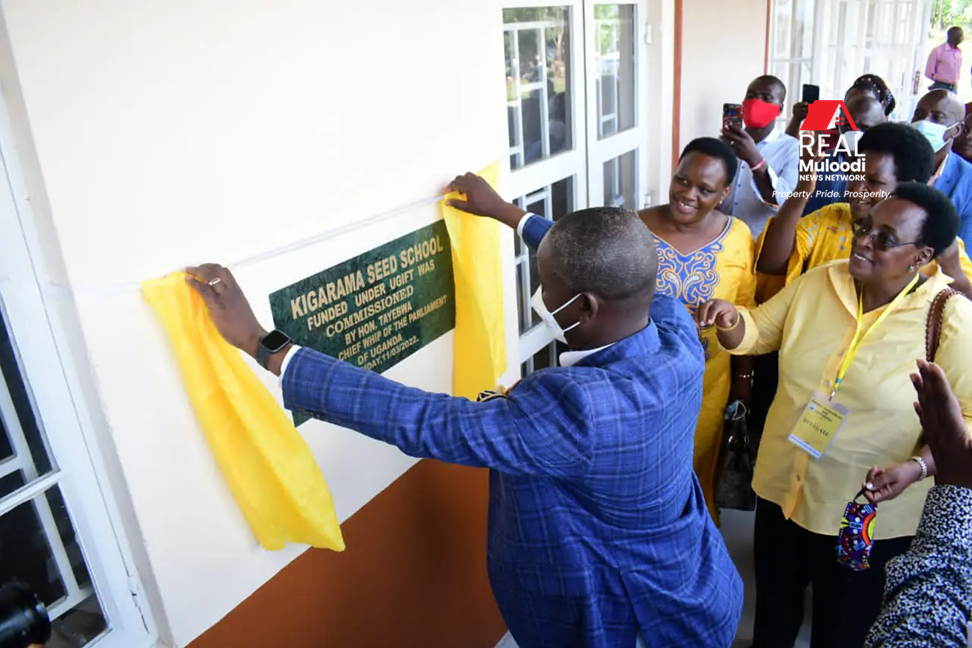UGANDA, Sheema | Real Muloodi News | Janet Museveni, Uganda’s First Lady and Minister of Education and Sports, last month announced that Government is constructing up to 259 Seed Secondary Schools in Subcounties currently without such schools. The schools are being developed under the Inter-Government Fiscal Transfer (UgIFT) programme, sponsored by the World Bank.
Seed schools are a government programme to cater for students from Senior One to Senior Four in a day-school setting; especially those students that cannot afford private schools.
The First Lady made the announcement during the Commissioning of Kigarama Seed School in Sheema District on March 11th, one of schools that has been constructed in the first phase of the project.
Construction of the 259 schools will be undertaken in three phases, the first phase covering 117 schools, the second phase 115 schools, and the third 27 schools.
Kigarama Seed School cost USh 2.5 billion to construct, according to Mr John Betungura, the Chief Administration Officer of Sheema District.
“This is a fully fledged school with teachers houses, library, administration and class room blocks, computer laboratory with 28 computers, multipurpose hall and a play ground. Special thanks goes to government to having strategically positioned this school in this area,” Mr Betungura said.
However, the First Lady admitted that due to resource constraints, some Sub-Counties, Divisions and Town Councils will miss out, especially the newly created.
To add to this, recent reports indicate that a number of the new seed schools which are already in use are understaffed. District Education Officers (DEOs) are now concerned that the quality of education will be impacted because of a lack of teaching resources.
While commissioning St Andrew’s Ndwaddemutwe Seed School in Mukono District, Dr John Chrysostom Muyingo, the state minister for Higher Education, acknowledged that the Ministry was aware of low staffing levels in the new schools, as well as a lack of critical amenities such as electricity and water mostly in hard-to-reach areas.
“This is a start. We may not be in a position to put in everything like teachers at full capacity, but the recruitment process has not closed. The Education Service Commission will soon advertise and fill the gaps. I, therefore, request that the Ministry of Finance which coordinates the implementation of the programme to prioritise the provision of the critical services to the schools,” Muyingo said.
Frevious Ssemakula, the headmaster at Kasangobe Secondary School, the first seed school to be constructed in Luweero District, says the Ministry is supposed to give USh29,400 per child per term. However, the school faces the challenge of parents not paying school fees, since most of them are poor. They either delay to pay or at times they default, making it difficult to run the school to pay the non-teaching staff, electricity bills, teachers welfare and meals.
“Parents need to be sensitised. When they hear that the Government is going to assist the school, they drop their responsibilities thinking that the Government is going to buy uniforms and text books,” observes Ssemakula.
A Makerere University study by Julius Omona found that there is an increasing demand for both primary and secondary education in Uganda, however there has been a general decline in the funding of education over the last two decades. Further, there has been a widening gap between actual funding and ideal funding, with a serious impact on educational outcomes.
The situation is even more dire considering students in Uganda are only recently returning to school following the world’s longest COVID-19 shutdown, having been out of the classroom from March 2020 – January 2022. While some schools attempted virtual education during this time, limited digital access means that the majority of young people have not been learning for nearly two years.
COVID-19 severely affected Uganda’s economy, with major shortfalls registered in domestic revenue collection, both at the central and local levels of government, compounding to the current budget limitations being placed upon schools.
Now more than ever, the Ministry of Finance, Planning & Economic Development must improve revenue collections to create the fiscal space for public spending, so that education can be prioritised and no students are left behind.
READ MORE LIKE THIS:
Construction of Wol Seed School in Jeopardy over Land Dispute
Asian Community Donates Contested Gulu Secondary School land to Government



